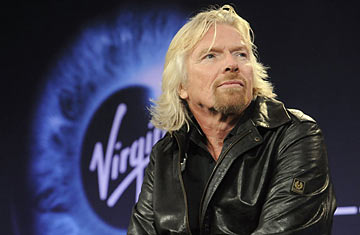
Richard Branson
Perhaps it's a case of big business aiming to bail out government, for a change.
The response by government to the threat of global warming has been underwhelming so far, a fact that remains little changed despite the political agreement negotiated at the U.N. summit in Copenhagen in December. But at least one business leader, the British billionaire and founder of the Virgin Group Richard Branson, says he has heard the alarm from scientists and environmentalists about climate change, and believes that the world must not waste time shifting away from oil and other fossil fuels.
"There are some of us who believe that the problem of warming is as bad as the First and Second World Wars combined," Branson told TIME in a recent interview at the climate summit in Copenhagen. "It's that serious, and you know the key is carbon, [but] there's no war room coordinating the attack on carbon."
So, Branson has taken it upon himself — unsurprisingly — to lead the charge against carbon. In 2010, he will officially launch the Carbon War Room, a corporate think tank of sorts, designed to incubate and spread the best ways to cut carbon in corporate sectors ranging from aviation to shipping to construction. It's a global-warming remedy by business for business, and given the paralysis in the international effort to curb climate change, it could be the right idea for the right time. "I think if the government can't deliver, it's up to industries to themselves," says Branson. "We have to make it a win-win for all concerned."
Branson's operation will start by addressing carbon emissions from a significant but little-known source that is not covered by any national or international regulations: global marine shipping. The massive container ships that ply the ocean lanes are the backbone of globalization, but they are also carbon hogs. Each year, about 100,000 ships contribute some 1.3 billion tons of CO2 to the atmosphere, about 3% of global carbon emissions. In addition, ships spew out huge amounts of traditional air pollutants, like nitrous oxides (NOx) and sulfur oxides (SOx), and emit black carbon soot, a leading contributor to melting Arctic ice. "It's an overlooked and important problem, but it's also extraterritorial," says Travis Bradford, the chief operating officer of the Carbon War Room, based in Washington, D.C. "And there's no external force that will cause the shipping industry to change."
But despite the sheer amount of carbon the shipping industry produces, its biggest emitters are relatively few. Bradford estimates that about 20,000 of the biggest and most polluting ships contribute about half the carbon emitted by the industry as a whole, so any solution to the emissions problem could be implemented much more easily than, say, changing the 800 million or so passenger cars in the world. "Ships could be retrofitted to be cleaner and more efficient quickly," says Bradford.
The Carbon War Room's goal is first to raise awareness about the carbon problem within industries, then to publicize and spread the best solutions. In the case of shipping, the solution may be as simple as installing scrubbers — of the sort already used in planes and cars — that would vastly reduce emissions of SOx, NOx and black carbon. Older and more polluting ships will need to be replaced by models that are more efficient, and eventually carbon-based bunker fuels will need to be swapped out for low-carbon alternative fuels. The Carbon War Room is looking to start the process by compiling information about which ships and lines are most efficient, and then pressing shipping companies — and the customers who depend on them — to use companies that have adopted the best practices.
Branson's presence in Copenhagen earlier this month was about more than just the U.N. summit. The city is home to the A.P. Moller-Maersk group, the largest container ship operator in the world. Get it on board, and others in the industry might follow. "That's the spirit behind the Carbon War Room," says José María Figueres, the former President of Costa Rica and a member of the group's executive board. "We want to be an assembling and rallying point for all those who want to bring market solutions to bear on carbon emissions."
Of course, Branson has no interest in any solution to global warming that would involve cutting back on the growth of business or, ultimately, consumption. In his own industry, air travel, Branson has pushed for research and development on alternative fuels that could reduce carbon emitted by planes, but he has also pushed for adding a new runway to London's overcrowded Heathrow Airport. For Branson, global warming will have to be solved by better technology and better practices, not by changing the way we live our lives. "As we move forward our challenge is to develop and fulfill the aspiration for well-being, but at the same time make decisions that reduce carbon emissions," says Figueres. "Filling that gap is going to make a nice business opportunity."
Given that the world is warming due in large part to business practiced as usual, it might seem unwise to let corporations take the lead on climate. And without at least the threat of government carbon caps and other regulatory action, it is hard to believe that all industries would take the initiative to reduce emissions — especially as the world staggers out of a recession. But with the current U.N. climate system looking dysfunctional in the wake of Copenhagen, and the prospects of cap-and-trade uncertain in the U.S. Senate, Branson might be playing the only game in town. "Governments have set carbon targets before that haven't been met," he says. "Business will have to do what government has failed to do."
